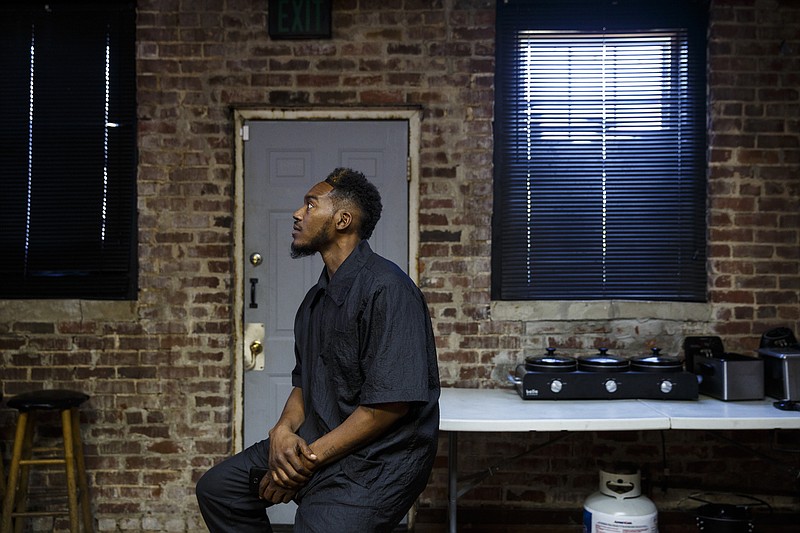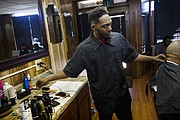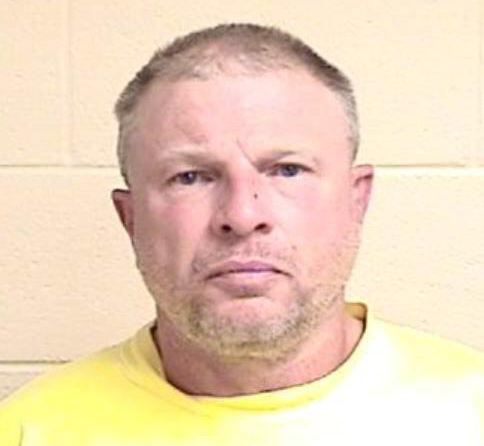He bounced in the back seat, tilted and shook his head, grinned and yelled as the chorus faded into the verse.
"In and out of jail, I was a wild child!
"My mama praying hard, I quit this lifestyle!"
Deisman Harrison, 29, was in a white Dodge Dart on a Friday night in August, the bass vibrating the windows while a friend steered down the highway. They smoked cigarillos and rapped along to "Stay Strong."
The song belongs to Harrison and his collaborator, Johnny Montgomery. Aka JJ. Aka Jay Mont.
As he listened to himself, Harrison, aka Mr. Epic, thought about what would happen in a couple of hours. He thought about strutting between a set of speakers and an audience as he spit lyrics at End Zone, a bar in East Ridge. This kind of performance used to feel routine.
But that was before a night last October, before an argument about sex and an angry stepfather and a gun and shattered glass and blood on a steering wheel. Back then, before all that, Harrison and Montgomery would roll to clubs in Cleveland, Tenn., Chattanooga and Atlanta almost every weekend.
But Montgomery isn't around anymore. And for months, Harrison stopped making music, the craft reminding him of the friend he watched die.
His mother told him to focus on a steady career, to avoid rap. It attracts the wrong crowd, she said. His girlfriend told him to stay in at night and play with the kids. There are too many random killings outside, she said.
But the summer came, and a friend asked for help writing a song. And Harrison remembered how rap could serve as therapy. He needed to return.
"Music is the key to everybody, the whole world," Harrison said. "That's the reason I want to do it: I want to express me, where I came from."
***
In the bar's parking lot, Harrison looked out the window, then at his friends. He smiled, sheepishly.
"It starts at 10," he said, looking at the bar's flier for an open mic event. "It's only 10:08."
"Yeah," said the driver, Derrick "Diesel" Studdard. "It's early."
They sat in the car for 10 minutes, swiping through friends' Facebook pages. Finally, Harrison shrugged his shoulders.
"Y'all ready?" he asked Studdard and another rapper in the car, Tron Ragland.
They paid a $10 cover, walked in and found six people: a DJ, a bartender, a man in an undershirt, a man in a tank top, a woman in a bright pink T-shirt and a woman in a Destin, Fla., long-sleeve top.
This didn't look like a rap venue. There were stained-glass hanging lights, neon beer signs and a strand of white Christmas lights, each dipped into an empty airplane bottle of Fireball Cinnamon Whisky. Harrison and Ragland walked over to the DJ to tell them what they wanted to perform later.
Harrison is from the Eastdale neighborhood. He's been rapping since he was 13, through arguments with teachers at Ooltewah High School, through the brick mason training at a Job Corps center in Kentucky, through the recession and the loss of work, through the birth of five children, through convictions for a 2006 robbery and a 2009 attempted aggravated burglary, through his cousin's homicide in 2012.
"If the right hands get my music," he said, "I'm going to blow up. I know that for a fact."
Harrison and Montgomery began collaborating at the beginning of 2013, after they listened to each other's songs online. Montgomery didn't trust many people, his girlfriend said, but he recognized potential. Harrison worked hard, and his aggressive style on the mic melded with Montgomery's laid-back approach.
The two worked together almost every day at the Hamilton Inn on Lee Highway, where Montgomery lived with his girlfriend. They found beats, wrote lyrics and recorded about four songs every week.
"Where I'm from you either live fast or you die young," Harrison rapped on one track, "Back in the Day."
"Don't want to end up -- up like the quarterback Vince Young."
Among a group of local performers, Montgomery was the most talented and dedicated, Harrison said. He could sing. He could rap. He could produce. His girlfriend said he made more than 200 songs, many of them still unreleased.
"He was a diamond," Ragland said. "He just had his rough edges. He hadn't been polished yet. He was going to be great. He was going to be somebody."
On Oct. 19, Ragland, Harrison and Montgomery took a break from a song they were working on, unsatisfied with the lyrics they had written. A woman named Nicole Carroll texted Montgomery, inviting him to her trailer in Rock Spring, Ga.
Ragland went home, but Harrison and Montgomery drove to Carroll's place with Edrius Putman, another rapper whom Harrison said he didn't know well. Harrison and Montgomery had sex with Carroll. Then, she said, Putman tried to have sex with her, as well.
They fought. Putman hit Carroll with a dehumidifier, according to police. Harrison said he didn't see anything, but he heard the two yelling. Then he heard Carroll's stepfather, Michael James Gobert, come out of his own trailer on the same property, shout something and fire his gun in the air.
Harrison heard Montgomery yelling at Putman, telling him to get in the car.
Montgomery backed up. Gobert felt threatened, he told police, so he fired some rounds. Montgomery drove forward, in the direction of Gobert, who stood between the car and the road where they could leave. Gobert fired more rounds.
Glass on the passenger's side shattered. Bullets hit the car, sounding like a staccato of aluminum bats connecting with baseballs. Harrison heard Montgomery scream.
"He shot me in the face!"
The car swerved and hit a shed. Putman ran away. Harrison sat for a second, hearing only his breath, not yet able to process what happened. He saw Montgomery slumped on the steering wheel. He reached forward, clutched Montgomery's shirt and pulled him back.
He let go, and Montgomery collapsed.
***
"I probably would have killed him if I had a gun," Harrison later said of Gobert, whom a jury convicted in May of felony murder. "I would have had a right to shoot back."
What really happened, though: Gobert demanded Harrison get out of the car and kneel on the grass. Gobert spit on him, yelled at him, demanded Harrison explain what he did to Gobert's stepdaughter. Then, police arrived.
Around 4 a.m., Harrison called Ragland. Then he called Montgomery's girlfriend.
Then he retreated from the world.
He had a series of nightmares, each ending with him in the back of that car, and Montgomery shot. He stopped sleeping. He flinched at an unexpected sound in his father's house. He skipped barber school for two weeks. He didn't see the point in going to work, and he felt scared around strangers.
At his mother's urging, he meditated.
"When you endure a lot of pain," he said, "you have to put yourself in a cocoon to emerge."
He returned to work at the barbershop. He met his girlfriend, Racquel Brown, there after cutting her son's hair. He was different than most of the guys she dated. More introspective. Also, more on edge when they went out, scanning the room for people who looked suspicious.
Still, even if he now takes precautions, Brown and Harrison's mother worry he will one day get shot. Doesn't matter if he's minding his own business. You can't account for bad luck.
In late August, after his show at End Zone, Harrison met with a friend named Rashaud Taylor and made plans to rap on some songs together. On Labor Day, Harrison was on Facebook when he read something about a shooting. A friend would later tell him Taylor was one of two victims.
"Another notch," Harrison would say.
He knows what other people in other parts of town think about all this, about all his friends who happen to die. Why is he around those kind of people?
"These are the people I went to school with, grew up with," he said. "Some of these people don't expect this. They were doing so good."
"There are great basketball players here," he added. "They might be lawyers. They might be the next president. Who knows? These are the people who get killed."
"I got a heart," he said. "It still hurts me every morning. Every morning I wake up and know I can't call this certain person I used to talk to every day."
But before another death, for a couple of minutes, at a bar on a night in August, Harrison wasn't reflective. It was 10 minutes after midnight; about 50 people had shown up.
"We got some of the hottest [rappers] in the region!" DJ The Vibe announced.
Ragland sat on a stool, bent in half, shaking his head to a bass line. Harrison stood behind him, hopping, waving his arms. The beat for "We Should Have a Party" thumped from the speakers.
It's a song Harrison and Montgomery released four months before the shooting. That night, Ragland would play Montgomery's part - his way of honoring one friend and helping another, he said.
Harrison circled Ragland and looked into his eyes. He's short, but with a microphone he looks confident. He raps fast and aggressively, like the Atlanta rapper T.I., the one with the millions of dollars and a house and his own car to drive around in.
In front of the crowd, channelling this kind of famous rapper energy, Harrison hopped, shrugged his shoulders and yelled.
"We still out here doing this thing!" he said. "We still out here working!"
Contact staff writer Tyler Jett at 423-757-6476 or tjett@timesfreepress.com. Follow him on Twitter @LetsJett.


